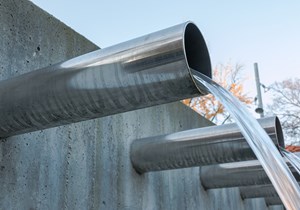Kansas City's Smart Sewer Program Selects Electro Scan for 22-Mile Sewer Condition Assessment Project
Electro Scan Inc. has announced that its patented technology has been selected for a 22-mile sewer condition assessment project for the City of Kansas City, Missouri as part of Kansas City’s Smart Sewer program.
As part of the project, California-based Electro Scan Inc. has provided a technology-as-a-service licensing agreement to have a national contractor complete the field work.
Part of Kansas City’s data-centric approach includes investing in knowledge about its existing infrastructure. Under the Smart Sewer program, Kansas City has surveyed ninety-seven percent (97%) of its sewer mains using traditional Closed-Circuit Television (CCTV) cameras and manual coding of defects using visual inspection.
In contrast, the use of machine-intelligent FELL technology automatically pinpoints defect locations and measures sources of infiltration in gallons per minute to help assess and prioritize pipes for rehabilitation, eliminating human subjectivity and manual coding of defects.
FELL technology will be combined with a hydrogeology infiltration approach developed by Special Assistant City Manager Andy Shively, to ensure accuracy. Shively’s hydrogeology infiltration approach will utilize Innovyze® InfoAsset Planner to overlay pipes with excessive Electro Scan defect flows with hydrogeological ‘at risk’ areas to strategically prioritize rehabilitation efforts.
By establishing a baseline leakage rate with Electro Scan technology, before rehabilitation, Kansas City's Smart Sewer program can estimate the percent reduction in infiltration immediately following repair, relining, or replacement capital projects.
"We look forward to Electro Scan delivering key intelligence on Kansas City's underground network," states Mark McIntire, President, McIntire Management Group, Electro Scan's exclusive representative in a 10-state territory.
In 2010, the City of Kansas City, Mo. entered into a 25-year agreement with the EPA to reduce the volume and frequency of sanitary sewer overflows.
The City’s $4.5 billion consent decree is the largest infrastructure investment in the City’s 160-year history and is funded entirely through wastewater enterprise funds. In order to meet its obligation, the City has increased wastewater rates by 291 percent since the onset of the program. In order to mitigate the size of additional rate increases, the City’s Smart Sewer program seeks innovative and cost-effective ways to meet the regulatory mandates.
Prior to awarding this project, Kansas City's Smart Sewer program conducted extensive trials of the technology resulting in the purchase of its own Electro Scan equipment currently used for its ongoing Stream Crossing Program to assess pipelines located in environmentally-sensitive areas and in close proximity to rivers and streams.
In 2018, FELL technology was used by Kansas City to assess 30,000 linear feet (LF) of recently installed Cured-In-Place Pipe (CIPP) and is currently included in rehabilitation specifications to test and certify liners for watertightness, in accordance with ASTM F2550 standard.
Related News
From Archive

- Glenfarne Alaska LNG targets late-2026 construction start for 807-mile pipeline project
- U.S. water reuse boom to fuel $47 billion in infrastructure spending through 2035
- $2.3 billion approved to construct 236-mile Texas-to-Gulf gas pipeline
- Major water pipe break in Puerto Rico hits over 165,000 customers
- Potomac River Tunnel project enters construction phase beneath Washington, D.C.
- Pennsylvania American Water launches interactive map to identify, replace lead water service lines
- Trump's tariffs drive $33 million cost increase for Cincinnati sewer project
- Utah city launches historic $70 million tunnel project using box jacking under active rail line
- Tulsa residents warned after sewer lines damaged by boring work
- Fatal trench collapse halts sewer construction in Massachusetts; two workers hospitalized




Comments